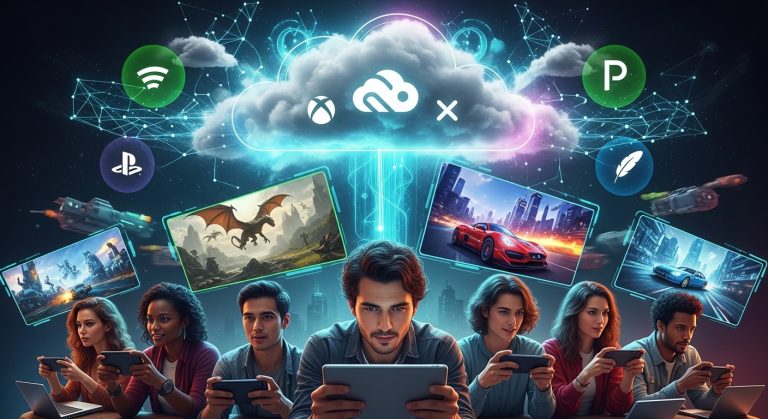
Exploring the Rise of Mobile Gaming: The Next Big Thing in the Gaming World
The world of gaming has undergone a remarkable transformation over the past decade, with mobile gaming emerging as a dominant force. As smartphones become increasingly powerful and accessible, the gaming landscape is shifting towards mobile platforms, captivating millions of players worldwide. In this blog post, we’ll delve into the rise of mobile gaming, examine the factors driving its growth, and explore the implications for the gaming industry as a whole.
The Evolution of Mobile Gaming
Mobile gaming has come a long way since the days of simple games like Snake and Tetris on early mobile phones. The advent of smartphones revolutionized the gaming experience, offering sophisticated graphics, immersive gameplay, and a vast library of titles to choose from. With the introduction of app stores, such as the Apple App Store and Google Play Store, developers gained a platform to reach a global audience, propelling mobile gaming to new heights.
The evolution of mobile gaming can be attributed to several key technological advancements. The proliferation of high-speed internet and 4G/5G networks has facilitated seamless online multiplayer experiences, enabling gamers to connect and compete with others around the world. Moreover, the integration of advanced graphics processing units (GPUs) in smartphones has made it possible to deliver console-quality graphics on mobile devices.
Key Factors Driving the Growth of Mobile Gaming
Accessibility and Affordability

One of the most significant factors contributing to the rise of mobile gaming is its accessibility and affordability. Unlike traditional gaming consoles and PCs, which often require significant financial investment, smartphones are widely available and owned by a large portion of the global population. This democratization of gaming has allowed individuals from diverse backgrounds to engage in the gaming world without the need for expensive hardware.
Freemium Model and Microtransactions
The freemium model, where games are free to download and play but offer in-game purchases, has become a cornerstone of mobile gaming. This model allows players to enjoy the game without upfront costs while providing developers with a lucrative revenue stream through microtransactions. Items such as cosmetic skins, power-ups, and additional levels entice players to make small purchases, contributing to the financial success of mobile games.
Casual Gaming Experience
Mobile gaming appeals to a broad audience due to its casual nature. Unlike traditional gaming, which can demand significant time commitment, mobile games are designed for short, engaging sessions. This flexibility allows players to enjoy gaming during commutes, breaks, or any spare moment, making it an ideal entertainment option for busy individuals.
The Impact of Mobile Gaming on the Industry
Shifting Market Dynamics
The rise of mobile gaming has disrupted traditional gaming markets, challenging the dominance of consoles and PCs. According to recent reports, mobile gaming revenue accounts for over half of the global gaming market, surpassing both console and PC gaming combined. This shift has prompted major game developers to adapt their strategies, investing heavily in mobile game development to capture a share of this lucrative market.
Cross-Platform Integration
With the increasing popularity of mobile gaming, developers are embracing cross-platform integration, allowing players to enjoy their favorite games on multiple devices seamlessly. This trend has led to the development of games that support cross-play, enabling users on different platforms to connect and compete with one another. As a result, the boundaries between console, PC, and mobile gaming are becoming increasingly blurred.

Esports and Competitive Gaming
The rise of mobile gaming has also fueled the growth of mobile esports, with competitive gaming gaining traction on mobile platforms. Mobile games like PUBG Mobile, Call of Duty: Mobile, and Mobile Legends have established themselves as popular esports titles, hosting tournaments with substantial prize pools. This trend has attracted sponsorships, investments, and a dedicated fan base, further solidifying mobile gaming’s position in the competitive gaming arena.
Challenges and Future Prospects
Device Limitations and Fragmentation
Despite its rapid growth, mobile gaming faces challenges, including device limitations and fragmentation. Not all smartphones possess the same processing power and capabilities, which can lead to varying experiences for players. Developers must optimize games for a wide range of devices, ensuring compatibility without sacrificing quality. This fragmentation presents a challenge but also an opportunity for innovation in creating adaptive gaming experiences.
Data Privacy and Security Concerns
As mobile gaming involves online interactions and transactions, data privacy and security concerns have come to the forefront. Players are often required to share personal information and payment details, making them vulnerable to cyber threats. Developers and platform providers must prioritize security measures to protect user data and maintain trust within the gaming community.
The Future of Mobile Gaming
The future of mobile gaming looks promising, with continued advancements in technology and innovation on the horizon. The integration of augmented reality (AR) and virtual reality (VR) into mobile games is set to revolutionize the gaming experience, offering more immersive and interactive gameplay. Additionally, the rollout of 5G networks will enable faster, more reliable connections, further enhancing the potential of mobile gaming.

Takeaways
The rise of mobile gaming represents a significant shift in the gaming industry, driven by accessibility, technological advancements, and evolving player preferences. As the market continues to expand, mobile gaming is poised to become the dominant force in the gaming world. By embracing new technologies and addressing challenges, developers and industry stakeholders can unlock the full potential of mobile gaming, offering players an unparalleled gaming experience on the go.
In conclusion, mobile gaming is not just a trend but a transformative force that is reshaping the gaming landscape. Whether you’re a casual gamer or a competitive esports enthusiast, the world of mobile gaming offers something for everyone, promising exciting developments and innovations in the years to come.
Exploring Innovations in Mobile Gaming
Cloud Gaming on Mobile
One of the most exciting prospects for mobile gaming is the advent of cloud gaming. By leveraging cloud technology, players can stream games directly to their mobile devices without the need for high-end hardware. This technology allows gamers to enjoy AAA titles that were previously exclusive to consoles and PCs, directly on their smartphones. Services like Xbox Cloud Gaming and Google Stadia are pioneering this space, offering a glimpse into a future where device limitations are minimized, and the gaming experience is more seamless and accessible.
Artificial Intelligence in Mobile Games
Artificial intelligence (AI) is another technological frontier being explored in mobile gaming. AI-driven features such as adaptive learning, where games adjust difficulty based on player skill level, and procedural content generation, which creates unique game levels and experiences, are becoming increasingly common. These innovations enhance gameplay and keep players engaged by offering personalized and dynamic experiences.

Social and Community Features
Mobile games are increasingly incorporating social and community features to foster player interaction and engagement. Features such as in-game chat, clans, and guilds allow players to connect, strategize, and build communities around their favorite games. Social media integration further amplifies this connectivity, enabling players to share achievements and invite friends to join the gaming experience. These social elements not only enhance player retention but also contribute to the overall enjoyment of mobile games.
Mobile Gaming for Education and Skill Development
Beyond entertainment, mobile gaming is emerging as a powerful tool for education and skill development. Educational games leverage the engaging nature of gaming to teach subjects such as mathematics, language, and science in an interactive manner. Applications like Duolingo exemplify how mobile games can make learning fun and accessible, encouraging users to develop new skills while enjoying the gaming experience.
Moreover, certain mobile games are designed to enhance cognitive skills such as problem-solving, critical thinking, and memory. These games challenge players with puzzles and strategic scenarios, promoting mental agility and cognitive development. As mobile gaming continues to evolve, its potential as an educational tool will likely grow, benefiting learners of all ages.
Environmental and Ethical Considerations
As the mobile gaming industry flourishes, it is crucial to consider its environmental impact and ethical implications. The production and disposal of electronic devices contribute to electronic waste, a growing environmental concern. Developers and manufacturers must prioritize sustainable practices, such as using eco-friendly materials and promoting recycling initiatives, to mitigate the environmental footprint of mobile gaming.

Ethically, the gaming industry faces challenges related to in-game purchases and the potential for addictive behavior. Developers are encouraged to implement fair monetization practices and provide resources for players to manage their gaming habits responsibly. Transparency in game design and monetization strategies can help build trust between developers and players, fostering a healthier gaming ecosystem.
The Cultural Impact of Mobile Gaming
Mobile gaming has not only transformed the gaming industry but has also made a significant cultural impact. It has become a global phenomenon, transcending geographical and cultural boundaries. Games like Pokémon GO have brought people together in public spaces, encouraging exploration and social interaction. Mobile gaming has become a shared cultural experience, influencing art, music, and even fashion, as gaming icons and themes permeate popular culture.
The storytelling potential of mobile games further enriches cultural narratives, offering diverse perspectives and immersive worlds. Indie game developers, in particular, have leveraged mobile platforms to tell unique stories that resonate with players worldwide. This democratization of game development has allowed for a wider range of voices and experiences to be represented in the gaming landscape.
Conclusion: Embracing the Future of Mobile Gaming
The rise of mobile gaming is a testament to the ever-evolving nature of the gaming industry. With its accessibility, technological innovations, and cultural impact, mobile gaming is poised to continue its upward trajectory, shaping the future of gaming in profound ways. As developers, players, and industry stakeholders embrace this dynamic landscape, the potential for mobile gaming is limitless.
In this exciting era of mobile gaming, players can look forward to more immersive experiences, diverse narratives, and opportunities for connection and learning. As technology continues to advance, mobile gaming will undoubtedly remain at the forefront of the gaming world, captivating and inspiring players across the globe for years to come.







